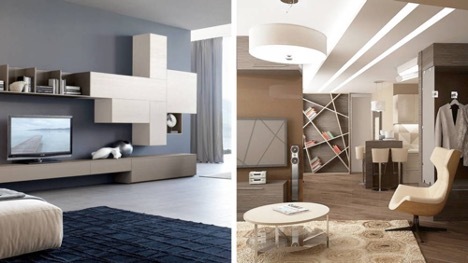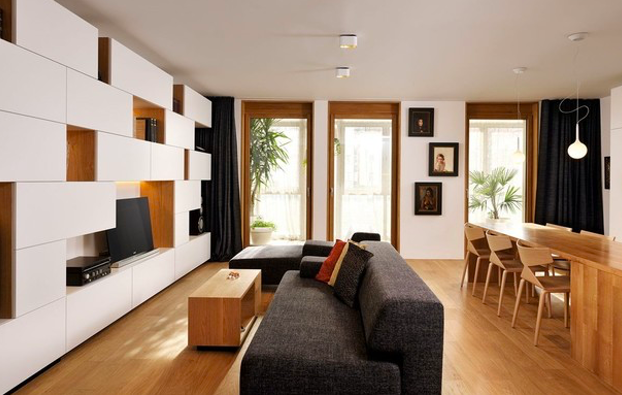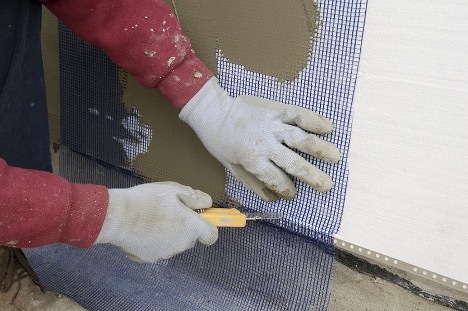The constructivist style in the interior is a reflection of the early Soviet period, when the desire for functionality and simplicity of form was key. This style became famous for its strict lines, geometric shapes and rejection of unnecessary decorative elements. How is the constructivist style embodied in modern apartment interiors, and what makes it so unique?

The content of the article
- Geometry and functionality: the basis of constructivism
- Manifestation of constructivism in various areas of the apartment
- Decorative elements and furniture in the constructivist style
- Design mistakes in the constructivist style
- Conclusion: constructivism as a reflection of the era in modern design
Geometry and functionality: the basis of constructivism
The basis of constructivism in interior design is geometry. Straight lines, clear shapes and lack of frills - this is what characterizes the constructive style. Functionality comes first: every element of the interior must be justified and executed with a minimum of decor.
Features of the constructivist style include:
- simple geometric shapes;
- functionality and minimalism;
- lack of decorative decorations;
- use of modern materials and technologies.
Manifestation of constructivism in various areas of the apartment
In the heart of the house - the living room, constructivism in the interior of the apartment is manifested in the strict lines of furniture and the absence of unnecessary elements. A sofa in the constructivist style usually has a simple but comfortable shape without frills.
A kitchen in the constructivist style emphasizes functionality and ergonomics. There is no room for frills; every centimeter of space is thought out and used with maximum efficiency.
In the bedroom, the constructivist style in the interior is manifested in the minimalism of furniture and textiles. A bedroom in the constructivist style is simple and comfortable, creating a calm and cozy atmosphere.
Decorative elements and furniture in the constructivist style
Constructivism furniture is a combination of functionality and modern design. The important elements are:
- Minimalism, which is characterized by the absence of unnecessary details and decor.
- Functionality, because every piece of furniture should be useful and practical.
- Geometric shapes and simple, clean lines.
Paintings in the constructivist style can also be an excellent addition to the interior. They are often characterized by geometric abstractions and strict lines, which emphasize the overall design concept.

Design mistakes in the constructivist style
The constructivist style in the interior is distinguished by strict geometric shapes, functionality and minimalist decor. However, as with any style, there is a risk of making mistakes when implementing it. Let's look at the most common mistakes and how to avoid them.
Constructivism is often associated with cool colors and strict forms. This can create an alienating and uncomfortable space if you don't add warm or bright accents. It is recommended to use warm shades in textiles or add bright decorative elements.
Despite the minimalism of the constructivist style, there is a risk of overloading the space due to improper placement of furniture or an excess of geometric shapes. It is important to maintain balance and not forget about the functionality of each element.
Constructivism prefers modern and durable materials. The mistake may lie in choosing inappropriate materials that do not fit with the overall style concept.
Each interior should reflect the individuality of the owner. Despite the rigor of constructivist design, it is important to add personal touches that make the space unique.
Lighting plays an important role in creating the atmosphere of a room. Insufficient or too bright lighting can distort the overall impression of a constructivist design.
By observing the principles of constructivism in the interior, as well as avoiding these mistakes, you can create a cozy, functional and aesthetically attractive space. Experiment with colors, textures and shapes to find your own unique take on the constructivist style in your home.
Conclusion: constructivism as a reflection of the era in modern design
Constructivism in the interior is not just a style, but also a reflection of the era, which is embodied in modern apartments. This style is suitable for those who value simplicity, functionality and strive for minimalism in the surrounding space. Strict lines, functional furniture and the absence of unnecessary decor make constructivism in interior design a relevant and attractive choice for modern houses and apartments.

